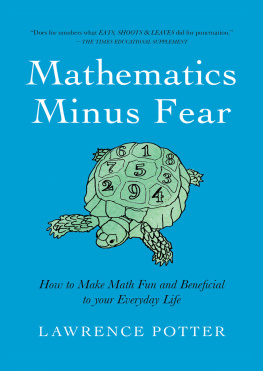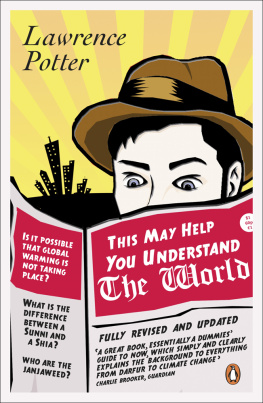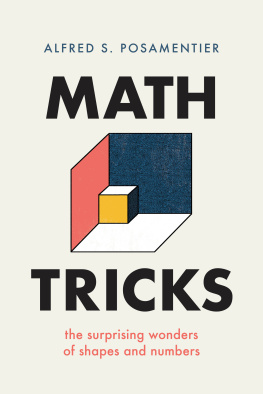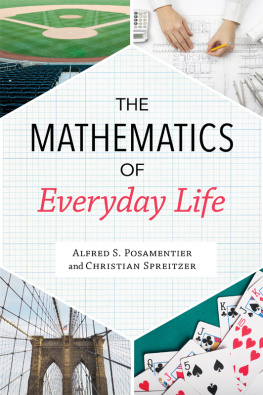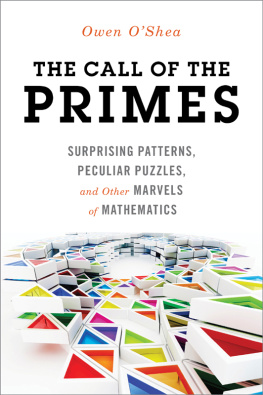Mathematics Minus Fear
How to Make Math Fun and Benieficial to Your Everyday Life

LAWERENCE POTTER

PEGASUS BOOKS
NEW YORK LONDON
Introduction: Why?
School. Nobody forgets it. It lingers on in your head as a source of comedy and confusion for the rest of your life. Its the ritual of it. A weird tyranny of teachers. Stand up, sit down. Hands out of your pockets. Silence. No skirts above your knees. Put that gum in the bin. Giant adult hands crashing down on desks. Red faces bellowing at you to Pay attention. Tests. Examinations. Results. Reports.
At the centre of the system is the classroom. When a classroom is in use, it is bathed in a ghastly artificial light just like the Engaged sign for an aircraft toilet. Inside, rows of heads hunch over rows of orderly desks, upon which, every year, students stick gum, write their name, and unpack their books.
Each type of classroom has a special flavour. The geography classroom has maps of the world on its walls, and pictures of erupting volcanoes, whilst the English classroom has neat displays of Your Best Work. The science classroom smells permanently of gas that has escaped from the taps for the Bunsen burners, whilst the gym just smells of sweat and pain.
But of all these flavours, it is often that of the mathematics classroom that has left the bitterest taste. Its walls are either left bare, or they are covered in uninspiring pictures of shapes and brightly-coloured multiplication tables. Inside this room waits the ordeal of quick-fire questions designed to expose and embarrass the weakest. In here, students open their little blue exercise books, and continue to fill them with row after row of calculations, whilst every furrowed brow and frustrated sigh signal the same unspoken message. I dont understand.
The mathematics teacher is the remote and tyrannical figure who rules this little world. His intense love of numbers has damaged his interpersonal skills, and his strange physical features have somehow interfered with his love of humanity. He asks the questions, and dismisses hours of labour with a few scratchings of his red pen. And he scrawls incomprehensible explanations on the blackboard, and then expects his students to solve the problems on the sheet in front of them by some mystical form of osmosis.
Just like any environment, the conditions of the mathematics classroom affect its inhabitants. The fear of getting an answer wrong means that for most the best chance of survival is silence. This group of children always have their heads bowed over their books with furrowed brows. They never let their eyes wander around the room for fear of making eye contact with the teacher. They could contribute more to class discussion (as their end-of-year report makes clear) but they never will.
If you were one of the silent ones in the classroom, your voice swallowed by self-doubt, then this book is for you. I hope you will find use for it, even if you were one of those who were more intent on dazzling the spotty child at the front with reflected sunlight from your watch.
I offer this book as a kind of therapy for all those who found mathematics difficult at school. As part of the therapy, I need you to trust me to take you on a journey back through time to the trauma of that mathematics classroom. You will once again have to face the watery eyes of a mathematics teacher magnified horribly through the thick lenses of his glasses as he glares at you in expectancy. In what follows, this monster goes by the name of Mr Barton. And, as this mans gaze slowly eats away at your self-belief, you will once again have to suffer the disdainful glance of his prim sidekick, the-cleverest-girl-in-the-class. In the pages to come, she is known as Bernadette Pressman.
I am not saying that the process will be enjoyable, but it is necessary, if you wish to finally put the ghosts of Mr Barton and Bernadette Pressman to rest. And you will not be alone. In the corner of the classroom sits Charlie Bissil. At heart, he is not a bad boy. But as lesson after lesson passes, he understands less and less of what Mr Barton says. There was a time when he stared earnestly at the board, and tried to construct some meaning from the symbols on it. But every time he felt close to success, Mr Barton and his red pen shattered his illusion. And so now he channels his energy into acts of small-scale rebellion. You will find him a useful ally in the ordeal you are about to face.
I hope that, in subjecting yourself to the therapy, you will come to understand some of those things that you never really understood at school, and which led you to believe that the whole subject of mathematics was a cruel joke. If this is the case, you will never again have to grope in your memory for rules copied down years ago into long-lost exercise books, nor will you have to continue to place your faith in the hands of Mr Barton (which were, after all, unnaturally sweaty). You will be able to face the world of mathematics with a renewed confidence in your own ability to understand it and to solve the problems that it throws at you.
And Mr Barton will cease to appear in your dreams to chase you through an eternal classroom, whilst assaulting you with questions from the nine-times-table and pieces of white-hot chalk.
I
Small Steps
It is the start of the school day. Most children are barely awake, but shuffle through the school corridors in a sleep-drugged state. In marked contrast to them, Bernadette is bright-eyed and straight-backed as she stands waiting for the beginning of the days dose of education at the front of a disorderly line outside the mathematics classroom. Charlie, too, is beginning to show signs of life. He has already managed to get his football confiscated by accidentally kicking it into the windscreen of the headmistresss oncoming car. Now he is concentrating on navigating around the school building according to his own strict rules of motion.
Strangely enough, although one of the underlying principles of these rules is to minimize the distance that he travels, they often result in making him late for lessons, because he regularly has to stop and wait for a particular obstruction to clear. It is fine to push through a group of smaller children, but experience has taught him that the same tactic is less suitable for larger children or teachers. He has tried to explain this problem in the past when accused of wilful tardiness, but, in general, his teachers struggle to understand that it is part of his religion to always walk in straight lines.
He arrives just as the last of his classmates are entering the classroom for the first lesson of the day, and slips quietly to his place in the back corner, placing his backpack on the floor under the desk. Mr Barton is writing the days date and a title on the board in spidery handwriting. Bernadette has arranged her pens and coloured pencils on the desk in front of her. They form a neat geometrical pattern around her eraser, which smells sweetly of strawberries. Charlie has forgotten his homework.
1. The postman comes every third day, the milkman comes every fourth day and the policeman comes every fifth day. One day they all turn up. How many days will it be before this happens again?
I know that you are probably a little defensive about your ability to do numbers. However, first of all, I want to get your achievements into context. Forget about the pressure of the school mathematics test. Wipe from your mind that little destructive silence that your teacher left just after you announced that you had only scored five out of ten. If you are able to do any sum either in your head or on paper that is a little miracle in itself. It means that you have already come a long way.
Next page
